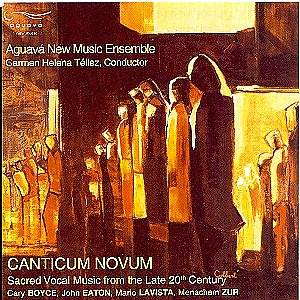The purpose of vocal music (unless as in the case of
Debussy, for example, voices are used as instruments without texts)
is to elevate a text to a level that is beyond the emotional capacity
of speaking. If the musical setting serves the text, then it can be
deemed a success. If it does not, then there was no reason to set it
in the first place. In this new recording of vocal music by living composers,
we are met with some definite successes and some abject failures, and
the blame or praise can be laid squarely at the feet of the composers.
Mario Lavistaís 1995 mass setting is a definite success.
In this version, which was recast from its original choral form into
a work for solo voices and a chamber ensemble of instruments, we have
a thoughtful and careful setting of the age-old mass text. It is a setting
that allows for plenty of virtuoso showcasing on the part of the singers,
but at the same time remains true to the intent of the words. One can
quickly conclude that this work probably fares better in its latter
disposition. The vocal lines, while appealing and at times hauntingly
lovely, are beastly in their disjunct melodies and other worldly harmonies.
Carmen Helena Téllez is a conductor with a fine ear for detail,
and she leads a group of first class singing and instrumental talent.
Balances are perfect and these singers handle the difficult vocal lines
with ease. If there be a bone to pick here, it is the annoying mispronunciation
of eleison in the opening movement. The singers consistently
voice the s (making it a z), which is incorrect in either Greek or Latin.
It is a pet peeve of mine and in both mass settings on this disc it
drove me to distraction.
Cary Boyceís By the Waters also receives a fine
performance, but one wonders why so many contemporary composers feel
compelled to put sopranos in the extremes of their ranges for extended
periods of time. Both Bridget Wintermann Parker and Susan Swaney are
human flutes and have amazing control over the purely celestial portions
of their voices, but one is left wondering why they are asked to use
their instruments thus.
To these ears, John Eatonís Mass from 1970/1996 fails.
The extended vocal techniques that the score requires serve no purpose
except to be weird for weirdís sake. The opening Kyrie asks for
most unattractive singing by the female voices, (again with the mispronunciation
of eleison) and the bassís repeated Ky-ri, Ky-ri, Ky-ri, Ky-ri,
Ky-rie sounds a good deal more like the summoning of oneís cat than
a plea for mercy. Of course, some mass settings are intended not for
liturgy but for concerts, but this one fails on both counts. I cannot
find one shred of evidence from listening to this Mass that the composer
had any other intention for the texts than that they were handy and
he did not have to look far to find them. Regardless of intent, the
words of the mass have deep and ancient spiritual meaning to millions
of people. In this case, that meaning eluded the composer.
Menachem Zurís interestingly macaronic setting of Psalm
150 is harmless enough if not completely effective. It is a worthy work
and receives a good performance.
The musicians on this recording are without question
of immense talent and skill. I have to wonder though why such fine talent
is applied to such music. This group would be better served to stick
to composers of Lavistaís ability and leave the others alone. There
is too much fine repertoire out there that never gets the kind of performance
that these musicians are capable of giving.
Sound quality is excellent; program notes are the ramblings
of composer-types who should spare us prose and stick to quavers.
Kevin Sutton
